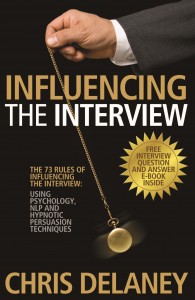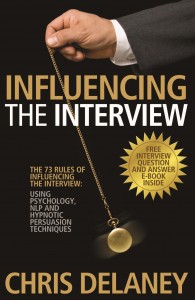The 73 Rules of Interview Influence – Job Interveiw book
Employment king is releasing a new book The 73 Rules for Influencing the Interview using Psychology, NLP and Hypnotic Persuasion Techniques. If you want to stand out in the job interview, if you want the employer to see you as pure gold, you will want to buy this book. Influencing the interview will give you the tools to beat even the most fierce competition.
- Rule No.1 Blow Out The Competition With a Secret Sales Pitch
Have an end game in mind from the beginning, create a strategy and use your unique selling point to crush the competition
- Rule No.2 Three Steps to Annihilation
Use the psychology of sales to annihilate the competition by becoming a desirable commodity
- Rule No.3 Stand Next to Stupid and Look Smart
To look more attractive stand next to the ugly person in the room, to look taller stand next to a short person, to appear smart stand next to someone stupid, as our mind is influence by comparison
- Rule No.4 Get Inside The Interviewer’s Head
Understand employers’ desires and offer it to them on a plate, become an object of aspiration, by the time you have finished, the interviewer will be fighting hard to control their impulse to offer you the job on the spot
- Rule No.5 Become a Valuable Asset
Money makes the world go round, highlight your value and the interviewer will have a longing to recruit you, as high value is always associated with quality
Can you master interview persuasion?
- Rule No.6 Alien Manipulation
Manipulation is employed by a seduction artist to sleep with the opposite sex; this technique is easily tweaked to manipulate the employers will
- Rule No.7 Discovering the Power of Values
Values and beliefs have started wars, genocides and put man on the moon – match the employer’s values and beliefs and become unstoppable
- Rule No.8 Make Your Interview Passionate
A passionate speech can influence thousands of people, mobilising a new workforce or persuading individuals to take arms against their oppressors. Be passionate and believe in your argument, influence the employer with passionate expression
- Rule No.9 MI5 Agent Technique
MI5 agents use rapport, influence and manipulation to infiltrate the enemy; they become an expert in the disguise and character identity, convincing the enemy that they are someone they are not
- Rule No.10 Cheat the Interview
Never lie obviously, give generalised feedback to questions and let the interviewer make their own opinion. Say your answers with confidence and quote researched information like it is your own opinion, as long as it highlights your expertise
- Rule No.11 Learn the Secret Language of Interviews
A secret language is used in sector specific interviews, learn this hidden communication and appropriately utilise terminology. With just a few memorised sentences verbalised in this foreign tongue you can appear fluent in this strange language
- Rule No.12 Secret Detective
To solve the case you need to dissect the crime scene and research the suspects, identifying key details in the investigation. In the interview knowledge is power; your research will help you locate the winning interview formula
Under the psychology of sales in job interviews
- Rule No.13 Undersell Yourself at Your Peril
Dry and dull interviews will not do you any favours, make the conversation light, fun and intriguing, using this opportunity to highlight all your relevant transferable skills – you must make yourself sound like a well rounded package
- Rule No.14 Wear a Condom
Stay safe! Being caught in a tricky situation can break or make the interview, seduce the employer by playing it safe until they are under your control, once manipulated you can lead and direct the interview
- Rule No.15 Not Cocky But Confident
Act how you want to be seen, make this impression last and in time you will naturally adopt this character unconsciously
- Rule No.16 Pain and Pleasure
Choices and decisions are made through the motivational influence of pain and pleasure (the carrot and stick) by controlling your own pain and pleasure influences you can delete interview fears and access interview confidence
- Rule No.17 Limit the Limiting Beliefs
A person’s belief system will change the direction of their life from failure to success, in an interview your belief system alone will be the difference to a job offer or an interview failure
- Rule No.18 Steal Confidence From Others
Can you really be accused of thievery when you’re only stealing mental information and systems from others? This technique will open new doors for you, just don’t get caught doing it!
Interview manipulation is only seconds away
- Rule No.19 Give Your Voice a Boost
Have you ever attended a meeting when all you wanted to do was fall asleep as the speakers/chair/your co-workers were so boring – their voices monotone droning on. Entertain your interviewer with your voice
- Rule No.20 Show Your Nerves, Confidently
Too much confidence means you’re too cocky, but if you’re too nervous then you’re no use to any employer. Win job interviews with a mix of confidence and nervousness; learn when you should sound nervous and when you should project confidence
- Rule No.21 Playing With the Devil
Negative self talk will kill your interview, don’t listen to the devil in your head or it will be the death of you, eradicate negative self talk and feel a new growth in confidence
For a full breakdown of each rule click here: Influence in Interviews
- Rule No.22 Destroy Painful Interview Memories
Our subconscious mind teaches us how to act in situations through learning from our past experiences. But when these experiences are negative your subconscious will attempt to keep you away from similar experiences, to overcome the fear of interviews you need to destroy any attached negative memories
- Rule No.23 Fast Interview Phobia Removal Technique
A person can have a real fear of spiders, heights and even job interviews as with all phobias these can be overcome but this often takes years of therapy. NLP offers us a way to rid your phobia quickly
- Rule No.24 Destructive Nightmares
Anxiousness controls you and will destroy your spirit, keeping you awake the night before the interview. An instant sleep technique will relax you, calm you down and offer you the best chance on the day of the interview
- Rule No.25 Don’t Let Your Handshake Show Your True Emotions
You are trying to impress people with your appearance, communication skills and body language, don’t let your moist hands let you down; this simple technique will change the interviewer’s first impression of you
Persuade any Interviewer with these 73 techniques
- Rule No.26 Disarm the Interviewer with Your Handshake
The interviewer is always trying to figure out the real you, a neutral handshake won’t give too much away which will intrigue the employer, but an overpowering handshake shows dominance – which is best for you?
- Rule No.27 The God Voice Technique
A feeble voice portrays weakness, answer interview questions with power and confidence; find your God voice
- Rule No.28 Master Memory Model
Impress the interviewer with your memory capacity. Increase your power of influence by being able to recall an abundance of information, facts and figures
- Rule No.29 Influence with Posture
Your body speaks volumes; with a little training you can use your posture to gain acceptance, to build rapport and to illustrate authority
- Rule No.30 The Secret Power of Your Unconscious
Why wait for the employer to speak before you start to influence the interviewer, a master influencer will be able to read the non verbal cues giving them the edge over other applicants and dominate the interviewer
- Rule No.31 Read the Interviewer Like a Book
Without knowing it the interviewer will give away their feelings and thoughts through their body language, use this silent communication to control the interviewer
- Rule No.32 Look Away and Miss the Hidden Clues the Eyes Give Away
The eyes are the windows to the interviewer’s soul, hidden in them are the clues as to what we are thinking, go one step further and use the eyes to mind read the interviewer giving you a real advantage over other less committed interviewees
- Rule No.33 Use Distracting Words at Your Peril
Words have power; the language you use can give you an edge, creating instant rapport and likeability or creating disinterest and confusion, leading to a breakdown in communication and likability
- Rule No.34 Build Likeability through Commonality
People like people who are like them, to influence your interviewer focus on commonality and build on this growing friendship as we find it hard to say no to someone we like
- Rule No.35 Energise the Interviewer
The difference between Extrovert or Introvert interviewers is how they acquire their energy, by mastering how to influence this personality trait you will increase the spirit of the interview
Use hypnotic persuasion in job interviews
- Rule No.36 Influence the Interviewers Decision Making Process
The interviewer’s role is to make a decision – to choose the best candidate. By influencing the interviewer’s decision-making process you can, at the extreme persuade the interviewer to employ you
- Rule No.37 Disguise the Information You Give the Employer
We process information differently depending on our personality type, once you master how your interviewer will filter your information you can use this knowledge to infiltrate the employer’s thought process
- Rule No.38 Deliver Your Answers the Way They Will Be Best Understood
Interview stress kills the interview, the interviewer after interviewing all day will feel pressured, tired and on the edge of annoyance – be sure not to fall into the trap of stressing the interviewer by wrongly presenting the structure of your interview
- Rule No.39 Persuade Through Personality
We are all different which means to be successful in all interviews you need to change your approach to influence each individual interviewer. A one way approach will be the death of your interview persuasion technique
- Rule No.40 Predict The Interview Questions
The power to predict interview questions allows you to prepare your answers with detail and precision, with the final result having a greater impact then your counterpart’s efforts
- Rule No.41 Get The Experts To Give You The Answers
Don’t do the leg work yourself ask the experts for the answers, use their power answers to emphasize your expertise and to pass interviews with confidence
Double your chances of interview success
- Rule No.42 Become a Website Detective
Only a fool doesn’t understand the power of knowledge, with research you will be able to uncover the company secrets that will guarantee you an offer in employment
- Rule No.43 Structuring Your Interview Answers Will Increase the Acceptability of the Interviewer
Most interviewees don’t understand the real structure of the interview process; they listen to a question and give a quick answer praying for the interview to be over. To be successful you need to understand how to structure your interview answer, the structure will create the basis for influencing
- Rule No.44 Repetition Increases Skill
Practice makes perfect, without practice you will be compelled to rush the interview and to fail. With practice comes an increase in skill and an increase in confidence – a winning formula for an interview
- Rule No.45 Conceal Your True Purpose in a Mock Interview
Repetition is the key to mastering any skill, increase your interview skills and practice your persuasion techniques by using a real interview as a rehearsal, testing your manipulation with your true purpose concealed
- Rule No.46 Create a Persuasion Loop
The end of the interview is more likely to be remembered then the start, use this section to reiterate your unique selling points
Persuade and influenceany job interviewer
- Rule No.47 Interactive and Energetic Presentations Create Intrigue
A presentation gives you the opportunity to manipulate the interview as you will have an uninterrupted focus; create intrigue, highlight your expertise and add hypnotic language patterns throughout – this will only work with practice
- Rule No.48 Get Others to Do The Hard Work – Get the Receptionist To Sell you to the Boss
We believe others, especially when they have no interest in the outcome or invested interest. Through the psychology of social proof; get an outsider to sell you to the interviewer and receive a boost through a positive character reference
- Rule No.49 Turn Other Interviewees into Nervous Wrecks
Control the opposition, make them like you and then destroy them using mental mind tricks without them even knowing what damage you have caused
- Rule No.50 Increase Likeness by Using Names
Remembering names increase likeness and likeness creates rapport – with a friendship in a bag you can influence the interviewer through the psychology of “liking” and people find it hard to say no to people they like
- Rule No.51 Catch Big Fish with Big Hooks
Understand the interviewer’s requirements and use this as bait, offer the interviewer what they want, add a little extra and they will be hooked
Master influential language in interviews
- Rule No.52 Gain the Interviewers Agreement
Nodding at the interviewers key points will increase rapport, once in rapport you can encourage agreement by nodding while explaining your key selling points which will influence the interviewer to agree with you
- Rule No.53 Infect the Interview
Likeability and rapport will affect the interview outcome, once you learn how to increase rapport you will affect the interviewers view of you at the bare minimum with an increase of likeness and at the utmost creating a passionate connection
- Rule No.54 Take the Interviewer on a Journey of Discovery
Be the author of the interview, take control by pacing the interviewer and use rapport to direct and lead the interviewer on a new journey
- Rule No.55 Interrogate the Competition
Everyone has a weakness, a fault, their own Achilles heel; it may be insecurity, procrastination or even an obsessive compulsive disorder, discover the limitations of the competition and exploit this
- Rule No.56 Create an Aura of Power
A group interview is one way for the employer to quickly disqualify those that they feel are lacking in the essential criteria required for the position. To stand out in a group interview you need to create an aura of power while making the other interviewees seem weak and helpless
- Rule No.57 Motivate With Pain, Motivate With Pleasure
People are motivated through pain or pleasure, discover your interviewer’s motivational trait and discover their weakness
Increase your interview chances – make a bigger impression
- Rule No.58 When You Don’t Agree with the Employer’s Point of View Change the Direction of the Conversation
A negative discussion started by the interviewer reflects badly on you through association; learn to direct any conversation, any negative comment to a positive topic of your choice
- Rule No.59 Gain Compliance By Getting the Employer to Agree With Everything You Say
To gain interviewer’s compliance, convince the interviewer to let their guard down, once they are open you can attack – manipulating as you see fit
- Rule No.60 Only Change the Employer’s Opinion if the Employer Has Negative Thoughts Towards You
When an employer takes a dislike to you, you need to manipulate the employer to first gain attraction, second to increase intrigue and thirdly for the interviewer to see you as commodity as precious as pure gold
- Rule No.61 Turn the Interviewer into a ‘Yes’ Man
Tag lines are used to gain compliance, they are highly powerful and need to be used only at certain points during the interview, when used you can encourage agreement and at the extreme the employer will comply with everything you tell them
- Rule No.62 Demand The Employer To Give You The Job
Make demands by secretly hiding them in conversation, this will bypass the conscious mind turning your interviewer into a puppet controlled by you
- Rule No.63 Suggest to the Employer Not to Offer You the Job
Mess with the interviewer’s mind, use reverse psychology – suggest that they don’t offer you a job which will compel them to offer you the position, the interviewer won’t understand why they are so compelled to hire you
- Rule No.64 Conceal Your Intentions by Simulating Choice
Suggest choice but don’t offer any, the interviewer will believe they have options but in reality they will have none
- Rule No.65 Make the Puppet Dance
Control the interviewer, put your words in their mouth and make them think and act the way you want them to, at the bare minimum you will lead the employer, when used with proficiency you will be in command
- Rule No.66 Use Social Proof to Influence – get others to highlight your strengths
People are sheep who will follow others and believe what they are told without any proof, sway the interviewer by quoting your past employer’s high appreciation of you
- Rule No.67 Create a Fantasy
Hidden meanings are understood unconsciously through stories and metaphors; create intrigue, anticipation and the interviewer will want to know more, this technique can help create a strong identity
- Rule No.68 An Argument Will Only Show Your Weakness
Negative put-downs can rupture the whole interview process and will make you look weak; handling negativity masterfully will not only save your skin but put the power back in your hands
- Rule No.69 Turn Around the Tide of Power; Interview the Interviewer
The power in an interview is unbalanced, take control, switch around the balance of power and gain authority – be careful this technique can back fire if you over exert your new found power
- Rule No.70 Master the Art of Performance
Don’t rely on the interviewer to remember you, create an unforgettable performance and like all shows leave the audience wanting more
- Rule No.71 Offer A Diamond With One Hand, Take It Away With The Other
Scarcity increases want, as we all want what we can’t have. Close the deal by offering them everything they want and more, and then just as quick take it all away
- Rule No.72 End as You Started with Manipulation Mind
To finalise your impact on the interview, secure an emotional attachment with the employer – don’t grow too comfortable at the end of the interview as your weaknesses may finally be uncovered
- Rule No.73 Look For Your Own Weakness and Stamp It Out
Pre-empt the employer, discover your own weakness and evolve into the final product through personal feedback. Become a master of interviews and an influencer of interviewers
make every interviewer eat out of your hand
If you enjoyed reading this article you will also enjoy reading:













